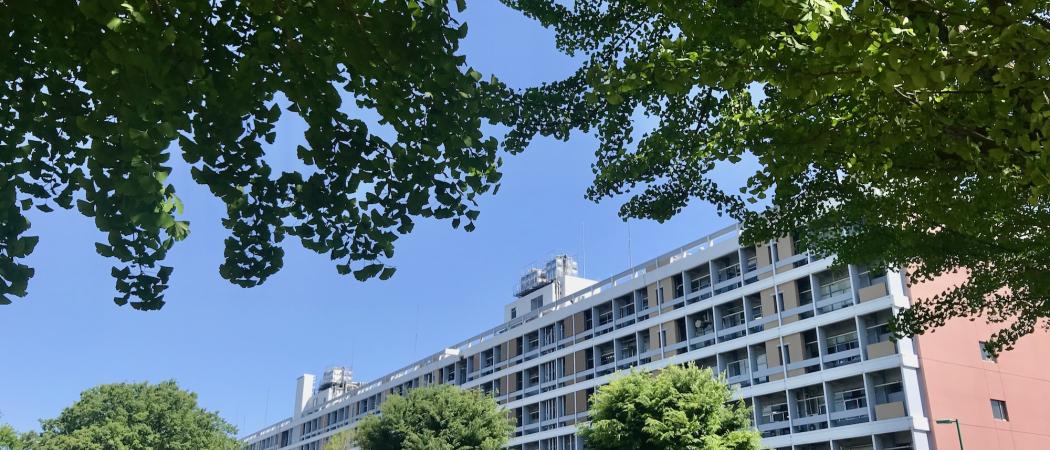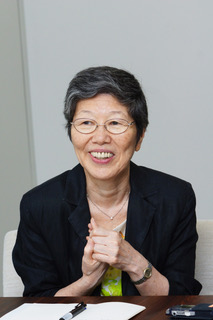The crisis is an opportunity to explore alternative visions for society, says RIKEN’s newly appointed international director

RIKEN headquarters. Photo: RIKEN.
Like its counterparts around the world, RIKEN, Japan's top research institute, is learning to refocus its efforts on the coronavirus emergency. Scientists from many fields – not just the infectious disease experts – are starting to ponder the imponderable: how will the world look after the emergency passes?
“Today, when we look at the challenge of coronavirus, we have to find a way to rebuild,” says Yuko Harayama, RIKEN’s director for international affairs, communication and diversity.
“After the pandemic, we have to foresee a future where humans are not dominating everything; humans are just one part of nature. We should not be arrogant to say we’ll dominate coronavirus. We’ll be aiming to survive, under controlled conditions.”

Harayama is, herself, a specialist in thinking about the future. As an executive member of the government’s Council for Science, Technology and Innovation, from 2014 to 2018, she was a chief proponent of the country’s “Society 5.0” thinking, an invitation to design a future where the cyber and physical worlds are seamlessly connected. It is an effort to create a new social contract and economic model by adopting the technological innovations of the “fourth industrial revolution”, with humans “at the centre of this process”.
The question that COVID-19 poses: is the plan now redundant? Harayama, who joined the country’s highest-ranked scientific institute on April 1, told Science|Business that she expects the crisis will greatly disrupt science collaboration in the short term, but make international cooperation even more important in the long term. And she thinks the crisis will give everyone the time to reflect on what a better future looks like.
RIKEN funding will be on offer for researchers who want to develop alternative visions of the future, Harayama says. “We need to have new thinking about collaborations; we have to explore new ideas.
“At the same time, we want to open this debate not only to experts, but also to citizens. COVID-19 is opening eyes,” she says.
Harayama says the ultimate goal is to produce “some kind of guidelines” to prepare for the future, which could look very different after the crisis. “Everyone has to be on board.”
Slow down
Harayama’s start at RIKEN coincided with the start of the crisis in Japan. “My first discussion was on how to deal with COVID-19. We had to protect our researchers and staff; we also had to be aligned with our government.”
Japan has not reported the sort of explosive rise in cases seen in Europe and the US. The country has over 15,000 COVID-19 cases, according to the John Hopkins University tally. The virus has killed at least 521 people in the country.
Yet even if the country appears to have escaped the worst of the COVID-19 carnage, Japan’s research community is experiencing the same sharp slowdown witnessed everywhere else.
The prime minister, Shinzo Abe, declared a nationwide state of emergency on April 16, encouraging people to avoid unnecessary outings and to observe social distancing, which has now been extended until the end of May. RIKEN have taken measures against coronavirus infections, including postponing or dropping research projects.
With the world’s researchers focused simultaneously on a single topic, “scientific discovery [in all other areas] has already slowed down. We are doing minimum tasks, like maintaining infrastructures and looking after [research] animals. Many programmes we were running are postponed,” she says.
RIKEN, an analogue to Germany’s famous Max Planck Society, managing fundamental research across Japan, employs some 3,000 scientists and commands a budget of about 95 billion yen (roughly €736 million).
The institute counts some 822 non-Japanese scientists among its ranks, but Harayama expects that recruitment from abroad is going to be harmed for several years. “Some [researchers] have been appointed for this year and have to wait to take up their positions in Japan. In the coming years, I don’t think we will have high mobility anywhere. Even taking flights will be much more complicated than before. To change your location will be a real difficulty,” she says.
While the pandemic is urgently bringing labs together around defeating COVID-19, it’s not clear if the money will be available to sustain these collaborations. The pandemic will hit funding pockets hard everywhere, Harayama said. “We will have more restricted budgets for R&D, that’s for sure.
Japan’s government on 4 May presented a massive 25.69 trillion yen (€220 billion) budget to fund emergency measures aimed at mitigating the COVID-19 economic shock. The package included €2.5 billion for government-industry-academia cooperation to develop treatments and vaccines domestically, and an additional €1.8 billion support for large international vaccine efforts run by the Coalition for Epidemic Preparedness Innovations and the Gavi Vaccine Alliance.
“To be realistic, even after six months or one year, we may never come back to where we were. Even when the situation [is] stabilised, it will never be the same again as before,” Harayama says.
Making friends in a crisis
The pandemic makes the work of an international director particularly complicated. Under ordinary circumstances, Harayama would be jetting around the world to introduce herself to key RIKEN partners. “I was planning to visit Europe, which is almost impossible now. We will have to explore different channels to establish a connection,” Harayama says.
Before the crisis hit, RIKEN was already exploring the possibility of upping its participation in EU R&D projects, finding new university partners in Europe, and forming new alliances with European companies. All of this work continues, but now under unstable circumstances.
The research institute opened an office in Brussels in late 2018, seeking to expand science collaboration in Europe. It also has a small, but long-standing, presence at the UK’s Rutherford Appleton physics lab near Oxford. RIKEN counts hundreds of scientific collaborations around the world, with a particularly strong tradition of working with Germany’s Max Planck. RIKEN researchers also collaborate with the French Alternative Energies and Atomic Energy Commission, or CEA, in supercomputing. The French National Centre for Scientific Research, CNRS, is also a partner in various fields.
The emergency is demonstrating that researchers are adaptable, Harayama says. “We have to think differently, and make use of our virtual connections. Among scientists, we have to explore new ideas and new ways of interacting. We are moving into an unknown space. It’s really a social experiment.
“If you’re already connected with people, it’s much easier. If you want to explore new connections, it’s going to be difficult.”
Harayama knows Europe well, having graduated with a mathematics degree from the University of Besançon in France, and a PhD in educational sciences and economics from the University of Geneva. In 2011, she was awarded a Chevalier de la Légion d’Honneur – one of five top distinctions awarded by the French state.
In the previous two years, Japan’s government had been keenly exploring the option of associate membership to the EU’s big €94.1 billion R&D programme, Horizon Europe, scheduled to begin next year. The Commission, for its part, wants to boost collaboration with wealthy countries, as a way to strengthen European competitiveness in science and technology. The normally laborious process to bring Japan and other non-EU countries into the programme has yet to happen. With countries still desperately firefighting the COVID-19 blaze, negotiations look unlikely to begin any time soon.
Without a formal agreement, Japan and EU will still find it possible to collaborate in simpler ways – for instance, jointly planning calls for research proposals on specific topics.
Harayama doesn’t know when either side will get round to talks, but says, “We need to advance. We can’t be isolated. It’s impossible to resolve the situation ourselves because the problem is so global.”
Research response
Harayama says she is impressed with the quick adjustment of RIKEN staff. “There was no complaining, they were happy to contribute solutions.”
RIKEN researchers are looking at potential therapeutic agents to treat the disease and have published data on the proteins associated with the novel coronavirus. A note on RIKEN’s website from the institute’s president, Hiroshi Matsumoto, says its researchers “will rise to meet [the coronavirus] test and contribute to overcoming the crisis.”
The institute’s new ‘Fugaku’ supercomputer, currently being installed in Kobe, already has capacity to do some data crunching, and will be giving priority to COVID-19 research. Fugaku is the successor to RIKEN’s K supercomputer, which was the fastest in the world in 2011.
Along with re-allocating some funding, the institute also has a discretionary spending pot for new COVID-19-related projects. The government may yet decide to shift more research money into COVID-19 too, Harayama believes. Back in February, the country launched a funding competition for researchers to chase six ambitious ‘moonshot’ goals by 2050, including the development of an artificial intelligence robot. The programme, worth 100 billion yen (€830 million) in total, may re-allocate some of its funding to defeating the virus, Harayama said.
Defending basic science
In Europe, COVID-19 has placed a spotlight on the usefulness of fundamental, long-shot research during a global crisis.
The scrutiny follows a very public resignation memo fired off by the head of the European Research Council, the EU’s premier science funder, last month. The scientist in question, Mauro Ferrari, accused the funder – and the EU in general – of lacking purpose and urgency in its research response to the emergency.
It hasn’t been like that in Japan, says Harayama. “For the moment we don’t have any specific pressure coming from politicians, but they are saying we put a lot of money into [basic sciences], and you should help solve immediate problems [of COVID-19],” she says.
Defenders of unguided research point to how it has produced many unexpected discoveries through time. RIKEN funding in the past has led to the discovery of nihonium, the 113th element on the periodic table.
Harayama says there is a normal amount of pressure and expectation from politicians and the public on RIKEN always.
“[Of course] we will need to defend, not just gain our budget, and justify the value of our science. We need to have a frontline on every domain to show we are doing something good,” she said.





 A unique international forum for public research organisations and companies to connect their external engagement with strategic interests around their R&D system.
A unique international forum for public research organisations and companies to connect their external engagement with strategic interests around their R&D system.